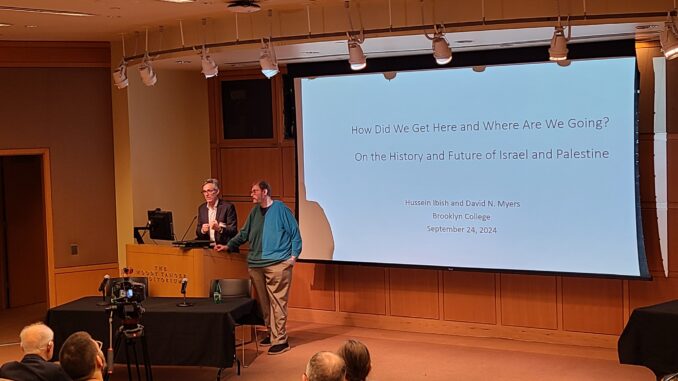
By Daniel Afanasyev
On Sept. 24, Brooklyn College hosted “How Did We Get Here and Where Can We Go? On the History and Future of Israel and Palestine.” As part of BC’s “We Stand Against Hate” initiative, its goals are aimed at “enhancing understanding and compassion” among the campus community, according to a Sept. 18 email sent to the student body.
The event featured two speakers: Hussein Ibish, a senior resident scholar at the Arab Gulf States Institute and author of three major studies on discrimination and hate crimes against Arab Americans, and David Myers, Professor of History and Sady and Ludwig Kahn Chair in Jewish History at UCLA.
The talk began with a brief overview of the history of Israel-Palestine leading up to Oct. 7, covering the history of the region, the gradual expansion of Israeli settlements, as well as the more recent escalation brought about by the far-right shift in Israeli leadership.
Speaking on what makes this particular conflict so devastating, Myer attributed it to the “clash of large collective and intergenerational traumas” embodied by events such as the Holocaust and the Nakba; Ibish offered the view that “on both sides of this divide you see a willingness to shrug about the suffering on the other side, […] there is a very powerful willingness to rationalize the horror on the other side.”
Both speakers also emphasized that the debate over what counts as genocide needs attention, but that viewing the conflict from a holistic viewpoint also needs attention in order to take into account the complexities of the situation.
“Very serious war crimes, very serious violations of international and humanitarian law have been committed, […] and we believe that must be attended to, and the debate over whether it is or isn’t genocide sometimes gets more attention, […] but that isn’t to say that the crimes that have been committed shouldn’t be forgiven or forgotten,” Myers said.
When speaking on the college campus protests later on in the talk, Ibish said that the debate on college campuses over words like “genocide” and “apartheid” are actually a successful strategy, especially for divestment campaigns.
“Debates over words [like genocide and apartheid] on college campuses is actually a good thing, and a smart movement in a campus that has that policy which restricted itself to objecting to companies doing business in the occupied territories,” Ibish said.
Throughout the talk, Myers emphasized the importance of placing oneself in the other’s shoes, and approaching the other side with empathy. “When you engage in conversations, remember that people very often bring very substantial parts of their identity to the conversation, so [stay] on the side of empathy and listen to what they say,” Myers said in conclusion.
With the one year anniversary of Oct. 7 also approaching, it remains to be seen what public discourse about Israel and Palestine will entail at BC.
